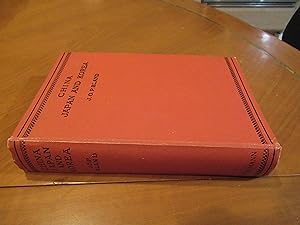john otway percy bland photographs (1 résultats)
CommentairesFiltres de recherche
Type d'article
- Tous les types de produits
- Livres (1)
- Magazines & Périodiques (Aucun autre résultat ne correspond à ces critères)
- Bandes dessinées (Aucun autre résultat ne correspond à ces critères)
- Partitions de musique (Aucun autre résultat ne correspond à ces critères)
- Art, Affiches et Gravures (Aucun autre résultat ne correspond à ces critères)
- Photographies (Aucun autre résultat ne correspond à ces critères)
- Cartes (Aucun autre résultat ne correspond à ces critères)
- Manuscrits & Papiers anciens (Aucun autre résultat ne correspond à ces critères)
Etat En savoir plus
- Neuf (Aucun autre résultat ne correspond à ces critères)
- Comme neuf, Très bon ou Bon (1)
- Assez bon ou satisfaisant (Aucun autre résultat ne correspond à ces critères)
- Moyen ou mauvais (Aucun autre résultat ne correspond à ces critères)
- Conformément à la description (Aucun autre résultat ne correspond à ces critères)
Reliure
- Toutes
- Couverture rigide (1)
- Couverture souple (Aucun autre résultat ne correspond à ces critères)
Particularités
- Ed. originale (1)
- Signé (Aucun autre résultat ne correspond à ces critères)
- Jaquette (Aucun autre résultat ne correspond à ces critères)
- Avec images (1)
- Sans impressions à la demande (1)
Langue (1)
Prix
- Tous les prix
- Moins de EUR 20 (Aucun autre résultat ne correspond à ces critères)
- EUR 20 à EUR 40 (Aucun autre résultat ne correspond à ces critères)
- Plus de EUR 40
Livraison gratuite
- Livraison gratuite à destination de France (Aucun autre résultat ne correspond à ces critères)
Pays
Evaluation du vendeur
-
China, Japan And Korea
Edité par William Heinemann, London Uk, 1921
Langue: anglais
Vendeur : Arroyo Seco Books, Pasadena, Member IOBA, Pasadena, CA, Etats-Unis
Membre d'association : IOBA
Edition originale
EUR 47,90
Autre deviseEUR 49,05 expédition depuis Etats-Unis vers FranceQuantité disponible : 1 disponible(s)
Ajouter au panierHardcover. Etat : Near Fine. 1st Edition. X, 327 Pp. Red Cloth Stamped In Black; Tissue-Guarded Frontispiece. First Printing With 1921 Date On Title Page And "William Heinemann 1921" On Copyright Page. Near Fine. John Otway Percy Bland (1863 -1945), Was Born On 15 November 1863 In Malta, The Second Son Of The Ten Children Of Major-General Edward Loftus Bland (1829-1923) And Emma Frances Franks (D. 1894). He Was Educated At Victoria College, Jersey And Trinity College Dublin. His Father Arranged For Him To Be Considered For An Appointment In The Chinese Maritime Customs Service. Bland Arrived In China In 1883, And Worked In The Customs From 1883 Until 1896, Serving In Hankou, Canton, And Peking, Serving There As Inspector-General Sir Robert Hart's Private Secretary From 1894 To 1896. From Early In His Career He Began Writing Light Verse About Life Amongst The Foreign Expatriate Communities In The Chinese Treaty Ports, Collected In Lays Of Far Cathay, In 1890. In 1896 Bland Resigned From The Customs To Take Up The Position Of Assistant Secretary To The Shanghai Municipal Council, Which Governed The Shanghai International Settlement, Succeeding To The Secretaryship The Following Year. As A Customs Employee He Had Been Forbidden From Writing To Or For The Press, But Now, As Well As Starting A Humorous Weekly, The Rattle, He Penned More Light Verse, And Commenced An Association With The Times As Its Shanghai Correspondent. Bland Began To Get Critically Engaged In The Politics Of Britain's China Policy, And Was A Vocal Advocate Of A Forward Policy, Especially With The Arrival On The Scene In China Of German Interests After 1897. At Shanghai During His Tenure Of His Post As Chief Administrator, The International Settlement Expanded In Size Threefold, And Bland Himself Was Active In The Shanghai Committee Of The British China Association, Which Advocated A More Aggressive Policy In China Than Its Parent Committee In London. He Left The Municipal Council In 1906 To Take Up A New Position With The British And Chinese Corporation (Bcc), Formed Largely By Jardine Matheson And By The Hongkong And Shanghai Banking Corporation In 1898, Becoming Its Peking-Based Agent Conducting Railway Loan Negotiations With The Chinese Government. This Ended In Acrimony In 1910 As Bland's Anti-German Proclivities Ran Counter To The Bank's Policy, And He Was Dismissed. The Following Year Saw The Termination Of His Relationship With The Times. Bland Returned To China Just Once More In 1920 Before His Death, But The Years After He Left Were Those Which Saw Him Carve Out A New Career As A Freelance Writer And Commentator, Mainly On Chinese Affairs. As Well As A Succession Of Commentaries, Recent Events And Present Policies In China (1912); China, Japan And Korea (1921), He Published More Light Fiction. He Became Best Known, However, As Co-Author, With Sir Edmund Backhouse, Of Two Best-Selling Accounts Of Recent Chinese History, Backhouse, Already Widely Known As A Sinologist Supplied The Source Materials For The Volumes, While Bland, Who Had Some Talent As A Writer, Fashioned Them Into Readable Manuscripts. These Books Were Highly Influential In Shaping Western Opinion About The Manchu Qing Dynasty And Cixi, The Late Empress Dowager. Unfortunately For Bland, Backhouse Was A Fantasist And Forger. Bland's Reputation Has Been Further Tarnished By His Furious Denunciation Of China's Nationalist Revolution, China: The Pity Of It (1932). Its Attacks On Post-Imperial China, On Its New Nationalist Aspirations And Politics Have Seen Bland Roundly Identified As The Quintessential 'Old China Hand', And A Reactionary, If Not A Racist; According To Hugh Trevor-Roper, However, In His Biography Of Sir Edmund Backhouse, Bland's Opposition To Chinese Nationalist Movements Was Based Upon His Belief That These Movements Were Essentially Unrealistic Westernized Elites Attempting To Impose A Corrupt Version Of A Foreign Style Of Government On A China That Was Unprepared For Such Radical Change.


